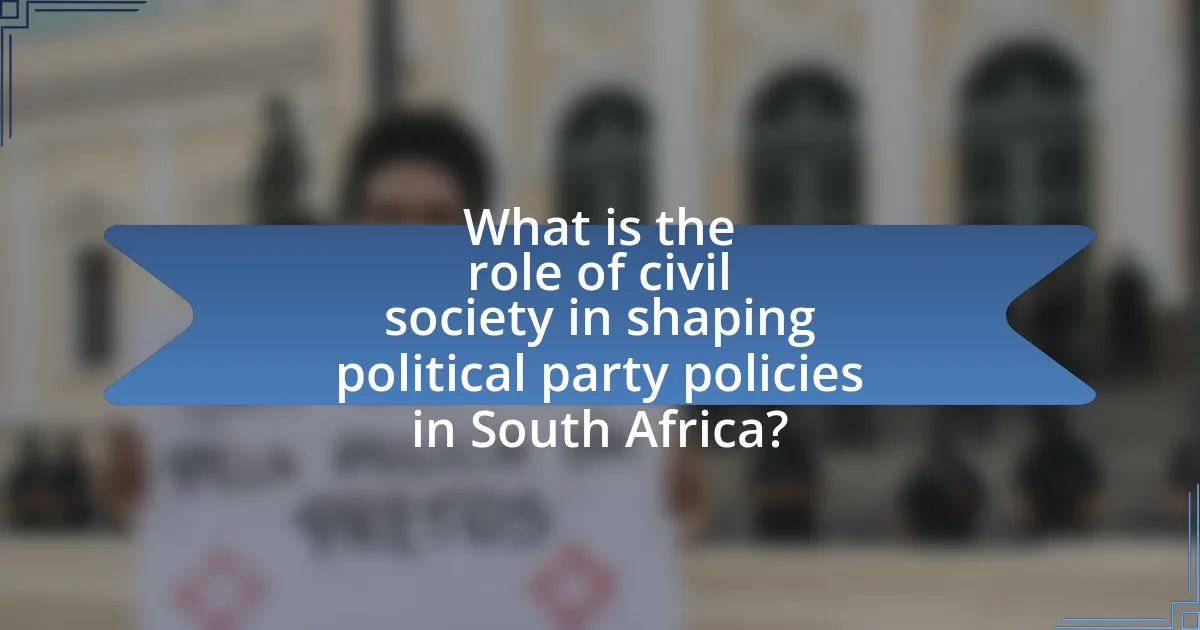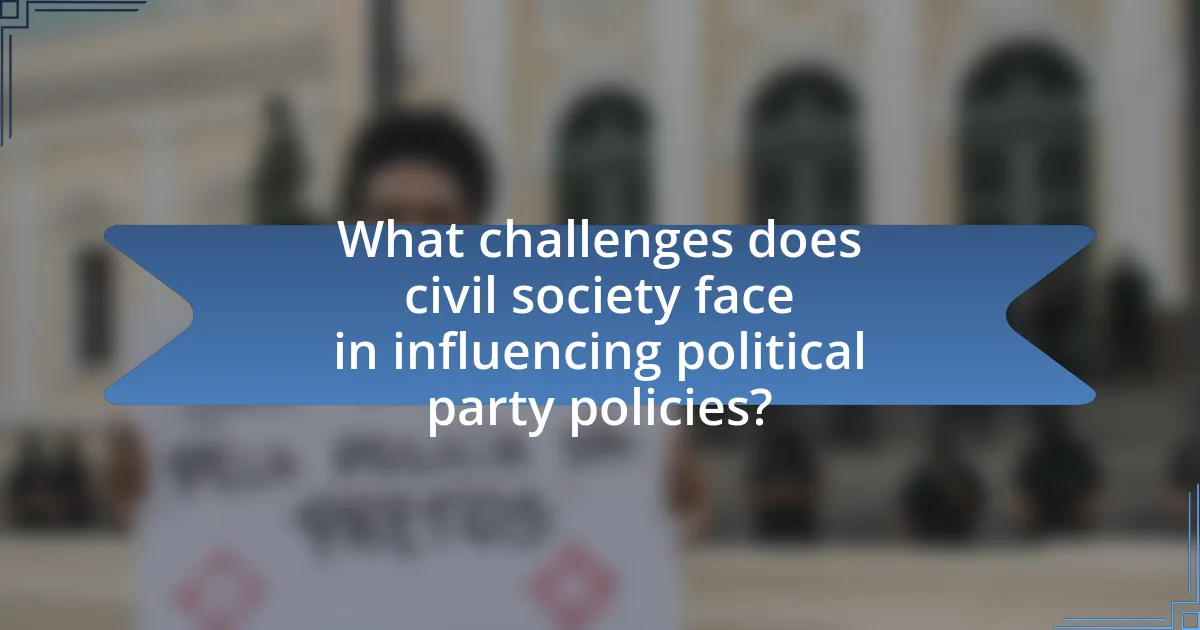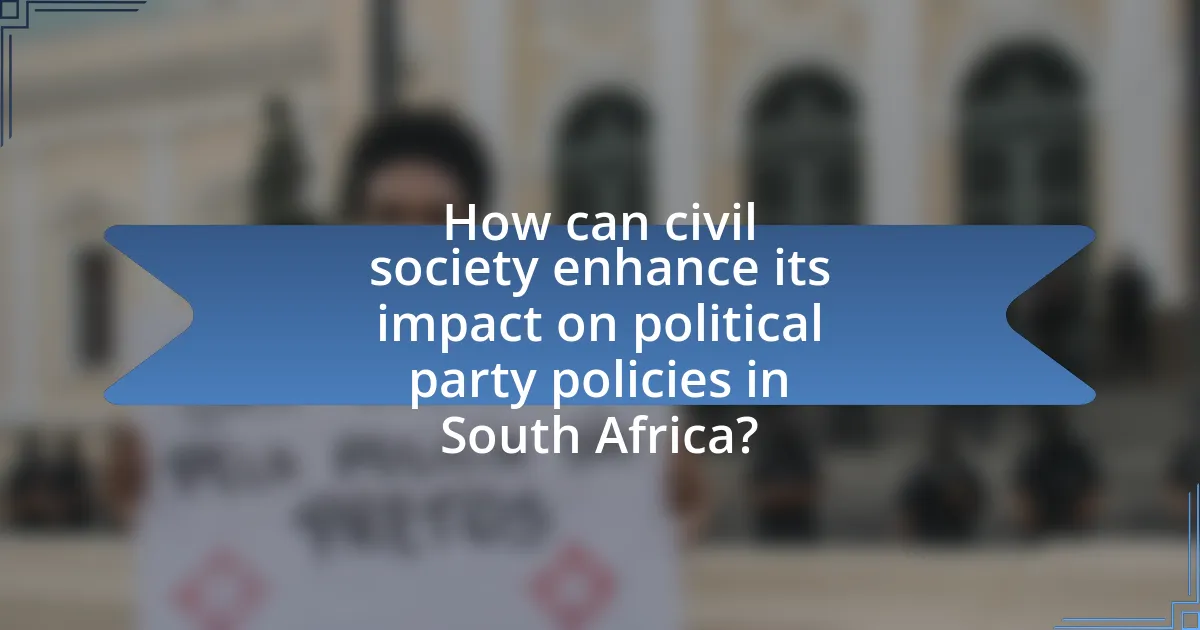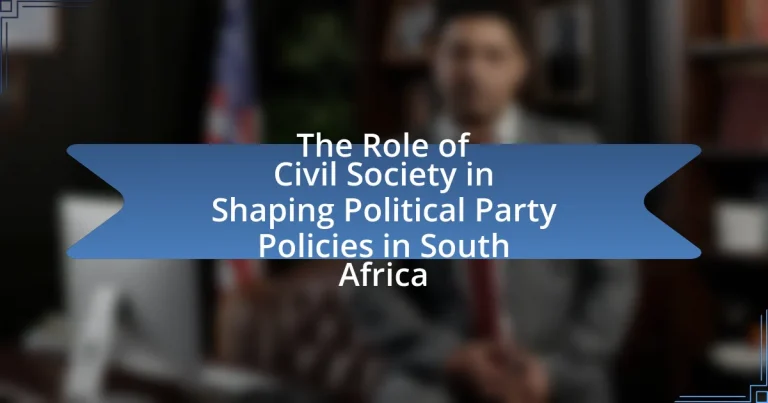The article examines the significant role of civil society in shaping political party policies in South Africa, highlighting its advocacy for social justice, accountability, and democratic governance. It discusses how civil society organizations, including NGOs and community groups, influence political agendas through public mobilization, lobbying, and participation in policy dialogues. The article also addresses the historical context of civil society’s impact, the challenges it faces in influencing policy, and the mechanisms it employs to engage with political parties. Additionally, it explores successful case studies and best practices that can enhance civil society’s effectiveness in advocating for policy changes.

What is the role of civil society in shaping political party policies in South Africa?
Civil society plays a crucial role in shaping political party policies in South Africa by advocating for social justice, accountability, and democratic governance. Organizations within civil society, such as non-governmental organizations (NGOs), community groups, and labor unions, actively engage in policy discussions, mobilize public opinion, and hold political parties accountable to their constituents. For instance, during the drafting of the South African Constitution, civil society groups significantly influenced the inclusion of human rights provisions, demonstrating their impact on policy formulation. Additionally, civil society’s ability to organize protests and campaigns, such as the Fees Must Fall movement, has pressured political parties to address issues like education funding and access. This engagement ensures that political party policies reflect the needs and aspirations of the broader population, thereby enhancing democratic participation and responsiveness in governance.
How does civil society influence political party agendas?
Civil society influences political party agendas by advocating for specific issues, mobilizing public opinion, and holding parties accountable. Organizations within civil society, such as NGOs and community groups, actively engage in policy discussions, providing research and expertise that shape party platforms. For instance, during the 2019 South African elections, civil society organizations campaigned for land reform and social justice, prompting political parties to incorporate these issues into their manifestos. This demonstrates that civil society not only raises awareness but also pressures political parties to respond to the needs and concerns of the electorate, thereby directly impacting their agendas.
What mechanisms does civil society use to engage with political parties?
Civil society engages with political parties through mechanisms such as advocacy, lobbying, public campaigns, and participation in policy dialogues. Advocacy involves organized efforts to influence political decisions and raise awareness on specific issues, while lobbying refers to direct interaction with policymakers to persuade them on particular legislative agendas. Public campaigns mobilize community support and raise visibility for issues, often utilizing media to amplify their message. Additionally, civil society organizations participate in policy dialogues, providing expertise and feedback during consultations, which can shape party platforms and policies. These mechanisms are evidenced by the active role of organizations like the South African Council of Churches and the Treatment Action Campaign, which have successfully influenced health and social policies through these strategies.
How do civil society organizations advocate for policy changes?
Civil society organizations advocate for policy changes by mobilizing public opinion, engaging in lobbying efforts, and conducting research to inform policymakers. These organizations often utilize campaigns to raise awareness about specific issues, thereby influencing the political agenda. For instance, in South Africa, organizations like the Treatment Action Campaign have successfully advocated for changes in health policy by highlighting the need for access to antiretroviral treatment, which led to significant government reforms. Their strategies include grassroots mobilization, legal action, and partnerships with other stakeholders, demonstrating their effectiveness in shaping policy outcomes.
Why is civil society important in the South African political landscape?
Civil society is important in the South African political landscape because it acts as a crucial mediator between the government and the public, fostering democratic engagement and accountability. Civil society organizations, such as NGOs and community groups, mobilize citizens to participate in political processes, advocate for human rights, and hold government officials accountable for their actions. For instance, during the anti-apartheid movement, civil society played a pivotal role in organizing protests and raising awareness about injustices, which ultimately contributed to the transition to democracy in 1994. This historical context underscores the ongoing significance of civil society in promoting transparency and influencing policy decisions in contemporary South Africa.
What historical context has shaped the role of civil society in South Africa?
The historical context that has shaped the role of civil society in South Africa includes the apartheid era, which lasted from 1948 to the early 1990s, and the subsequent transition to democracy. During apartheid, civil society organizations, including trade unions and anti-apartheid movements, played a crucial role in mobilizing resistance against racial oppression and advocating for human rights. The formation of the African National Congress (ANC) and its alliances with civil society groups exemplified this dynamic. The end of apartheid in 1994 marked a significant shift, as civil society continued to influence political discourse and policy-making, contributing to the establishment of a democratic framework that emphasized civic engagement and accountability. This historical trajectory underscores the ongoing importance of civil society in shaping political party policies in post-apartheid South Africa.
How does civil society contribute to democratic processes in South Africa?
Civil society contributes to democratic processes in South Africa by promoting civic engagement, advocating for human rights, and holding the government accountable. Organizations such as the Treatment Action Campaign and the South African Council of Churches mobilize citizens to participate in political discourse and influence policy decisions. For instance, the Treatment Action Campaign played a crucial role in the fight for access to antiretroviral treatment, which led to significant changes in health policy. Additionally, civil society organizations often conduct research and provide evidence-based recommendations to policymakers, thereby enhancing transparency and fostering informed decision-making. This active participation and advocacy by civil society are essential for strengthening democracy and ensuring that diverse voices are heard in the political arena.

What challenges does civil society face in influencing political party policies?
Civil society faces significant challenges in influencing political party policies, primarily due to limited access to decision-makers and the political process. This restricted access often results from the entrenched power dynamics within political systems, where established parties may prioritize their interests over public input. Additionally, civil society organizations frequently encounter resource constraints, which hinder their ability to mobilize effectively and advocate for policy changes. For instance, a study by the Institute for Democracy in Africa highlights that many civil society groups lack sufficient funding and capacity to engage in sustained advocacy efforts. Furthermore, political parties may resist external influence, viewing civil society as a threat to their authority, which can lead to marginalization of these organizations. These factors collectively impede the ability of civil society to shape political discourse and policy outcomes in South Africa.
How do political dynamics affect civil society’s effectiveness?
Political dynamics significantly influence civil society’s effectiveness by shaping the environment in which these organizations operate. When political regimes are supportive, civil society can engage in advocacy, mobilization, and service delivery more effectively, as seen during South Africa’s transition to democracy in the 1990s, where civil society played a crucial role in policy formulation. Conversely, in repressive political contexts, such as during periods of authoritarian rule, civil society often faces restrictions that hinder its ability to operate, limiting its impact on policy and governance. For instance, the South African government’s increasing regulatory measures against NGOs in recent years have constrained their capacity to influence political discourse and policy-making.
What are the barriers to civil society participation in policy-making?
Barriers to civil society participation in policy-making include limited access to decision-makers, lack of resources, and insufficient capacity for advocacy. Limited access occurs when civil society organizations are not included in consultations or decision-making processes, which diminishes their influence. Lack of resources, including financial constraints and inadequate staffing, hampers the ability of these organizations to engage effectively. Insufficient capacity for advocacy refers to the lack of skills and knowledge among civil society actors to navigate complex policy environments, which can lead to ineffective participation. These barriers are documented in various studies, including the “Civic Space in South Africa” report by the Human Sciences Research Council, which highlights the challenges faced by civil society in influencing policy.
How do government regulations impact civil society organizations?
Government regulations significantly impact civil society organizations by shaping their operational frameworks and influencing their ability to advocate for policy changes. Regulations can impose restrictions on funding, limit the scope of activities, and require compliance with reporting standards, which can hinder the effectiveness and sustainability of these organizations. For instance, in South Africa, the Nonprofit Organizations Act of 1997 mandates registration and compliance, which can create bureaucratic challenges for civil society organizations. Additionally, regulations that restrict foreign funding can limit resources available for advocacy efforts, thereby affecting their capacity to influence political party policies.
What role does public perception play in civil society’s influence?
Public perception significantly shapes civil society’s influence by determining the legitimacy and effectiveness of its advocacy efforts. When the public views civil society organizations as credible and aligned with their values, these organizations can mobilize support, drive policy changes, and hold political parties accountable. For instance, in South Africa, movements like #FeesMustFall gained traction due to widespread public support, which pressured the government to reconsider higher education funding policies. This illustrates that positive public perception can amplify civil society’s voice and impact on political decision-making.
How does media coverage affect civil society initiatives?
Media coverage significantly influences civil society initiatives by shaping public perception and mobilizing support. When civil society initiatives receive positive media attention, they often gain increased visibility, which can lead to greater public engagement and funding opportunities. For instance, a study by the Media Monitoring Africa organization found that initiatives highlighted in the media experienced a 30% increase in community participation. Conversely, negative media coverage can undermine these initiatives, leading to public skepticism and reduced support. Thus, the nature of media coverage directly impacts the effectiveness and sustainability of civil society efforts in South Africa.
What strategies can civil society use to improve public support?
Civil society can improve public support by engaging in grassroots mobilization, fostering community dialogue, and utilizing social media campaigns. Grassroots mobilization involves organizing local communities to participate in advocacy efforts, which can increase visibility and support for specific issues. Fostering community dialogue allows civil society organizations to understand public concerns and tailor their messaging accordingly, thereby building trust and rapport with the community. Social media campaigns can amplify these efforts by reaching a broader audience, facilitating discussions, and encouraging public participation in civic matters. For instance, organizations like the Treatment Action Campaign in South Africa have successfully used these strategies to garner public support for health-related policies, demonstrating the effectiveness of these approaches in influencing political agendas.

How can civil society enhance its impact on political party policies in South Africa?
Civil society can enhance its impact on political party policies in South Africa by actively engaging in advocacy, mobilizing public opinion, and participating in policy formulation processes. Advocacy efforts, such as campaigns and lobbying, can influence political parties to adopt specific policies that reflect the needs and interests of the community. For instance, organizations like the Treatment Action Campaign have successfully pushed for changes in health policies by raising awareness about HIV/AIDS and mobilizing public support. Additionally, civil society can utilize social media platforms to amplify their messages and reach a broader audience, thereby shaping public discourse and pressuring political parties to respond to societal demands. By participating in public consultations and policy discussions, civil society groups can provide valuable insights and expertise, ensuring that political party policies are more inclusive and representative of diverse perspectives.
What best practices can civil society adopt for effective advocacy?
Civil society can adopt several best practices for effective advocacy, including building coalitions, engaging in evidence-based research, and utilizing strategic communication. Building coalitions enhances collective strength and influence, as seen in successful campaigns like the Treatment Action Campaign in South Africa, which united various stakeholders to advocate for access to HIV/AIDS treatment. Engaging in evidence-based research ensures that advocacy efforts are grounded in factual data, which can persuade policymakers; for instance, studies by the South African Institute of Race Relations have shown the impact of policy changes on social issues. Finally, utilizing strategic communication, such as social media campaigns, can amplify messages and mobilize public support, as demonstrated by the #FeesMustFall movement, which effectively raised awareness about educational funding issues. These practices collectively enhance the effectiveness of civil society advocacy efforts.
How can collaboration with other stakeholders strengthen civil society efforts?
Collaboration with other stakeholders can significantly strengthen civil society efforts by enhancing resource sharing, increasing advocacy impact, and fostering collective action. When civil society organizations partner with government entities, private sector actors, and community groups, they can pool resources such as funding, expertise, and networks, which amplifies their capacity to address social issues effectively. For instance, a study by the Southern Africa Trust highlights that collaborative initiatives in South Africa have led to more comprehensive policy advocacy, resulting in improved social outcomes. Furthermore, joint efforts can create a unified voice that is more persuasive in influencing political party policies, thereby ensuring that civil society’s concerns are adequately represented in the political arena.
What role does grassroots mobilization play in influencing policy?
Grassroots mobilization plays a crucial role in influencing policy by empowering communities to advocate for their needs and priorities directly to policymakers. This form of mobilization fosters collective action, enabling individuals to organize around specific issues, thereby amplifying their voices and increasing visibility in the political arena. For instance, in South Africa, movements such as the Treatment Action Campaign have successfully lobbied for changes in health policy, demonstrating how grassroots efforts can lead to significant legislative outcomes. These mobilizations often utilize strategies like petitions, protests, and community meetings to engage citizens and pressure government officials, ultimately shaping policy decisions that reflect the interests of the community.
What lessons can be learned from successful civil society initiatives?
Successful civil society initiatives demonstrate the importance of community engagement and collaboration in influencing political party policies. These initiatives often highlight the effectiveness of grassroots mobilization, as seen in South Africa’s anti-apartheid movement, where collective action led to significant political change. Additionally, successful initiatives emphasize the need for transparency and accountability, as organizations that operate openly tend to gain public trust and support, which is crucial for sustained impact. Evidence from the South African context shows that civil society organizations that effectively communicate their goals and engage with diverse stakeholders can drive policy reforms, as illustrated by the work of organizations like the Treatment Action Campaign, which successfully advocated for access to HIV/AIDS treatment.
Which case studies illustrate effective civil society influence on policy?
Case studies illustrating effective civil society influence on policy in South Africa include the Treatment Action Campaign (TAC) and the Right2Know Campaign. The Treatment Action Campaign successfully advocated for access to antiretroviral treatment for HIV/AIDS patients, leading to significant policy changes in the government’s healthcare approach. This campaign mobilized public support and utilized legal action, resulting in a landmark Constitutional Court ruling in 2002 that mandated the government to provide treatment. The Right2Know Campaign, focused on promoting transparency and access to information, effectively influenced the Protection of State Information Bill, leading to public protests and amendments that strengthened civil liberties. These examples demonstrate how organized civil society can shape policy through advocacy, legal action, and public mobilization.
How can these lessons be applied to future advocacy efforts?
The lessons learned from the role of civil society in shaping political party policies in South Africa can be applied to future advocacy efforts by emphasizing the importance of collaboration, strategic communication, and grassroots mobilization. Collaboration among diverse civil society organizations enhances resource sharing and strengthens collective influence, as evidenced by successful campaigns like the Treatment Action Campaign, which effectively advocated for HIV/AIDS treatment access. Strategic communication ensures that advocacy messages resonate with the public and policymakers, demonstrated by the use of social media platforms to amplify voices and engage younger demographics. Grassroots mobilization fosters community involvement and ownership of advocacy initiatives, as seen in the #FeesMustFall movement, which united students across the country to demand affordable education. These approaches can guide future advocacy efforts to be more impactful and sustainable.
What practical steps can civil society take to improve engagement with political parties?
Civil society can improve engagement with political parties by establishing structured dialogue platforms that facilitate regular communication and collaboration. These platforms can include town hall meetings, policy forums, and collaborative workshops where civil society organizations and political representatives discuss key issues and policy proposals. Evidence from the South African context shows that initiatives like the Public Participation Framework have successfully increased citizen involvement in governance, leading to more responsive political action. By actively participating in these structured engagements, civil society can influence political agendas and ensure that the voices of diverse communities are heard in policy-making processes.


